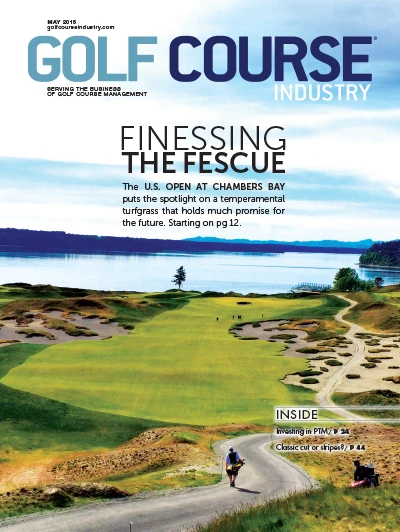
 Tim Moraghan Tim Moraghan |
I’m writing this column while watching the last round of the Masters, the event that says a new golf year has begun. In professional golf, the future looks to be in good hands. Thank you, Jordan Spieth and Rory McIlroy. And thank you, Tiger and Phil, for still making a case for the “old guys.” I’m looking forward to many spirited battles between the generations. Looking at our world – “real” golf and the work we do to keep it fresh, interesting and safe – I’m feeling pretty good about where we are and where we are heading, but I’m also wary. All is not perfect and we need to stay aware. Whether you are a “young gun” or an old fart, I suggest keeping the following in mind as you get ready for the new season. WaterThe use and lack of it will be our biggest concerns for years to come. Look at the terrible drought conditions in the West, especially California, and you can understand why golf courses and other major users of irrigation will be under the microscope. Which is why the smartest thing we can do with water is to use as little of it as possible. Even though courses account for less than 1 percent of the water used in the U.S., we will be very visible targets. Be prepared. Many of our fellow superintendents will be severely tested trying to make the best of a difficult situation. They will face water restrictions that could affect how they do their jobs, even if they keep their jobs. And all this while it’s their members and guests who are washing their Ferraris and taking long, hot post-round showers. The aura of AugustaSpeaking of water always gets me thinking about Augusta. I admit I love almost everything about the Masters: the history, traditions, competition, much of the design. However, it’s agronomic Disneyland, and about as far from reality as our industry can go. It will always be that way. With its unlimited resources –money, labor, equipment, chemicals – Augusta National can afford to be, well, Augusta National. Unless you have the same deep pockets, you shouldn’t even try. If you’re in the Northeast and your course is just coming back into view (has the snow melted yet?), bear in mind that you can’t have Augusta-like conditions in a month, and probably not by season’s end, either. Nor do you want them. Trying to keep up with the Bobby Joneses is impractical, expensive, not very good for the turf long-term, and, let’s be honest, most of your golfers aren’t good enough to play it or appreciate it. When someone on your green committee asks why the course doesn’t look like Augusta, ask right back when they’re going to quadruple your maintenance budget. And even then it might not be enough. Online agronomyI’ll bet that at some point in the next few months, one of your members/golfers will say to you something like this. “Hey, Bob, you know those brown spots on the 12th green? Well, I went onto the Internet and found out how to fix them.” How will you respond?In this age of WebMD, online legal and marital advice, and everything else just a click away, you have to be ready for the “Internet savvy” golfers who think whatever they read on their screens is the gospel truth. Especially if they think it will make their golf course better. I suggest you thank Mr. Google for taking the time and trouble to look into the problem, and say that you’ll do some more research, too, but, in fact, you’re already well aware of the problem and working on it. (If you’re not, that’s another issue.) But also say that while the suggestion could have some merit, reading about course maintenance on the web is a little like practicing self-surgery: That is, there’s more to the solution than just getting some simplified information. And even if the writer is an expert in agronomy, he’s not dealing with the specific situations you face at your course, anything from water restrictions to geography to tight budgets. Ask your helpful member if all the Internet advice in his business is dead solid perfect. Do it politely, but also make sure to get across that you’re the expert. Then fix the problem. It’s supposed to be funSomething else I think of when watching the Masters is that the only way I’m getting a green jacket is to buy one. I’m just not that good. And neither are the golfers at your course. Both superintendents and golfers should remember that the game is supposed to be fun. Take a good, hard look at how your golf course is set up. The priority should be the enjoyment of those who play. Super and golfer, put your ego aside. The only time the course should play hard is during the club championship or some other day (a special outing, hosting a local event) when low-handicappers outnumber duffers. Course setup has a huge effect on how golfers feel about the course and their games. You want people to play at a reasonable pace, score reasonably well based on their abilities, and have fun. Happy golfers are happy customers (or members), which keeps the superintendents happy, too. And employed. Ask the pro when the good players are coming. On every other day (the vast majority of them), make the course fair and fun, not hard. And be sure to educate your staff so they get it, too. New year, old problems?It’s a new golf season, and just like on Jan. 2, time to look back and think, “What can I learn from last year?” Your job is hard enough without repeating last year’s mistakes. So what did you learn — good and bad — from last season that you need to remember this year? Take a few minutes every day to review processes and procedures that worked, and those that didn’t. Make notes, stay informed and maintain regular communication with your staff and club management. Perhaps the most important thing to remember is that you are not alone. But you only get the benefit of others’ assistance — their knowledge, hard work and camaraderie — if you keep them in the loop and part of the team. It’s a new year: Make the most of it.
Tim Moraghan, principal, ASPIRE Golf (tmoraghan@aspire-golf.com). Follow Tim’s blog, Golf Course Confidential at http://www.aspire-golf.com/buzz.html or on Twitter @TimMoraghan |
Get curated news on YOUR industry.
Enter your email to receive our newsletters.
Explore the May 2015 Issue
Check out more from this issue and find your next story to read.
Latest from Golf Course Industry
- Turfco introduces riding applicator
- From the publisher’s pen: The golf guilt trip
- Architect Brian Curley breaks ground on new First Tee venue
- Turfco unveils new fairway topdresser and material handler
- Ignite Attachments adds new box plane and grapple
- Mackenzie & Ebert working on new Caribbean course
- Keswick Hall renovating Full Cry course ahead of big year
- The alpha wolf





